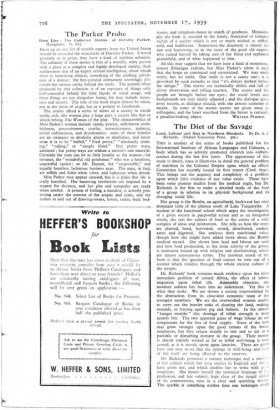The Parker Probe
Here Lies : The Collected Stories of Dorothy Parker. (Longmans. 7s. 6d.)
HIGH up on any list of notable exports from the United States should be recorded the wisecracks of Dorothy Parker. Uttered privately or in print, they have a kind of ruthless urbanity. The urbanity of these stories is that of a worldly, witty person with a place in a complex and highly developed society, their ruthlessness that of an expert critical intelligence, about which there is something clinical, something of the probing adroit- ness of a dentist : the fine-pointed instrument unerringly dis- covers the carious cavity behind the smile. The general effect produced by this collection is of an exposure of things only half-concealed behind the false façade of social usage, and these things are not altogether funny, for they include mean- ness and misery. The title of the book might almost be taken, not in the sense of ci-git, but as a pointer to falsehoods.
The stories afford a series of views of a society in which spoilt,- rich, idle women play a large part, a society like that to which belong The Women of the play. The characteristics of Miss Parker's women include vanity, avarice, selfishnes‘ snob- bishness, possessiveness, cruelty, insensitiveness, jealousy, trivial ordinariness, and drunkenness: some of these females are no strangers to alcoholic gloom or ebullience, and know what it is to be " boiled," " fried pretty," " absolutely stink- ing," " rolling," or " simply blind." Not pretty ways, admitted ; but pretty ways are seldom a satirist's raw material. Certainly the men can be as little lovable as the women—for instance, the " wonderful old gentleman " who was a heartless, ungrateful egotist ; or Mr. Durant, the " respectable," and equally heartless, lecherous business man. The men, in fact, are selfish and fickle when sober, and ludicrous when drunk.
Miss Parker may appear amused, but it is plain that she is really horrified. Her bantering revelations are inspired by a respect for decency, and her pity and sympathy are ready when needed. A person of feeling, a moralist, is actively pro- testing under the exterior of the sceptic and cynic, and she rushes in and out of drawing-rooms, hotels, trains, back bed-
rooms, and telephone-boxes in search of goodness. Occasion- ally she finds it, secreted in the lonely, frustrated or tortured victim of a society which is not so much wicked as selfish, cold, and indifferent. Sometimes the discovery is almost too raw and harrowing, as in the story of the good old negress who ruined herself by taking care of her blind and orphaned grandchild, and of what happened to him.
All this may suggest that we have here a kind of monstrous, almost Zolaesque realism, but Miss Parker's talent is such that she keeps us convinced and entertained. We may smile wryly, but we smile. Our smile is not a sunny one ; it is provoked by such remarks as that " it's always darkest before the deluge." The stories are technically skilful and full of clever observation and telling touches. The scenes and the
• people are brought before our eyes ; the social levels and backgrounds are very nicely adjusted ; and the dialogue gives away secrets, as dialogue should, with the utmost economy of means. In some of the stories secrets are given away in soliloquies, and the heart snatched from the breast is certainly




































































 Previous page
Previous page